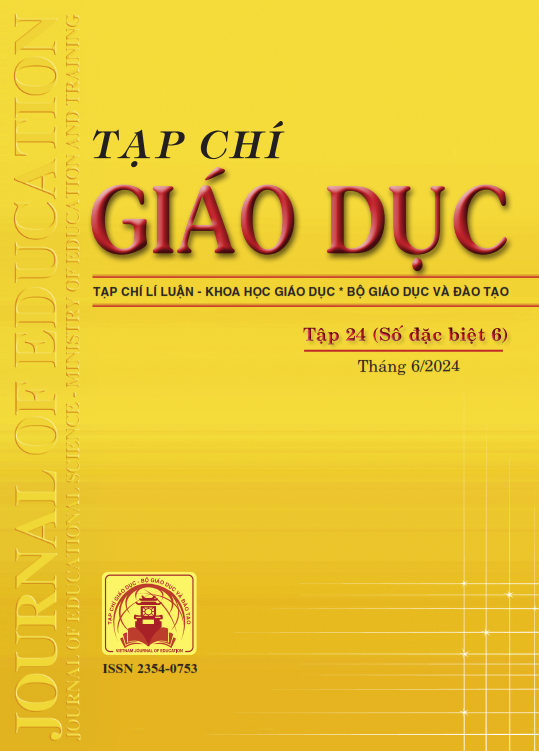Cấu trúc và các đặc tính của hệ sinh thái giáo dục số
Tóm tắt
The implementation of digital transformation in countries around the world and in Vietnam is being carried out extremely strongly under the impact of the 4.0 industrial revolution. Education is quickly taking advantage of the convenience and flexibility of online learning; autonomous learning; learner-centered. The article presents the results of theoretical research on the basis for formation, composition, and structure of a digital education ecosystem and proposes the concept of “Digital education ecosystem”, from which the author proposes 5 characteristics of a digital education ecosystem include: circularity, interactivity, symbiosis, sustainability, and systematicity. This research result contributes to the theoretical foundation to create a digital ecosystem to support teaching and learning in the digital transformation period, combining face-to-face and online.
Tài liệu tham khảo
Berge, Z. L., & Collins, M. (1995). Computer-mediated scholarly discussion groups. Computers & Education, 24(3), 183-189.
Bronfenbrenner, U, (1999). Environments in developmental perspective: Theoretical and operational models. In S. L. Friedman & T. D. Wachs (Eds.), Measuring environment across the life span: Emerging methods and concepts, pp. 3-28, American Psychological Association. https://doi.org/10.1037/10317-001
Chang, V., & Guetl, C. (2007). E-Learning Ecosystem (ELES) - A Holistic Approach for the Development of more Effective Learning Environment for Small-and-Medium Sized Enterprises (SMEs). 2007 Inaugural IEEE-IES Digital EcoSystems and Technologies Conference, 420-425. https://doi.org/10.1109/DEST.2007.372010
Dewanti, P. (2016). Linking national standards of distance education with e-learning ecosystem. Journal of Theoretical & Applied Information Technology, 86(3), 382-393.
Ficheman, I. K., & Lopes, R. (2009). Analyzing requirements with the digital learning ecosystem approach. 2009 3rd IEEE International Conference on Digital Ecosystems and Technologies, 265-270. https://doi.org/10.1109/ DEST.2009.5276714
Giannakos, M. N., Krogstie, J., & Aalberg, T. (2016). Video-based learning ecosystem to support active learning: application to an introductory computer science course. Smart Learning Environments, 3(1), 1-13. https://doi.org/10.1186/s40561-016-0036-0
Gütl, C., & Chang, V. (2008). The use of Web 2.0 Technologies and Services to support E-Learning Ecosystem to develop more effective Learning Environments. Data engineering and management, ICDM 2008 Proceedings, 145-148.
Harasim, L. N., Hiltz, S. R., Teles, L., & Turoff, M. (1995). Learning networks: A field guide to teaching and learning online. Cambridge, MA: The MIT Press.
Hecht, M., & Crowley, K. (2020). Unpacking the Learning Ecosystems Framework: Lessons from the Adaptive Management of Biological Ecosystems. Journal of the Learning Sciences, 29(2), 264-284. https://doi.org/ 10.1080/10508406.2019.1693381
Kuskin, W. (2018). Mapping the New Education Ecosystem. Introduction to the Special Issue. Voprosy Obrazovaniya / Educational Studies Moscow, 4, 9-20. https://vo.hse.ru/article/view/15608.
Leong, P., & Miao, C. (2008). Ubiquitous digital E-learning ecosystem. 2008 2nd IEEE International Conference on Digital Ecosystems and Technologies, 346-351. https://doi.org/10.1109/DEST.2008.4635159
Markoska, R. (2017). Development of an open source digital educational ecosystem: Case study. New Trends and Issues Proceedings on Humanities and Social Sciences, 4(3), 85-93. https://doi.org/10.18844/prosoc.v4i3.2519
Nguyễn Mai Hương, Trần Thị Lan Thu, Ngô Hoàng Đức (2021). Hệ sinh thái giáo dục trực tuyến. Tạp chí Khoa học Giáo dục Việt Nam, số đặc biệt tháng 1, 12-19.
Nguyen, L. T., & Tuamsuk, K. (2022). Digital learning ecosystem at educational institutions: A content analysis of scholarly discourse. Cogent Education, 9(1), 2111033. https://doi.org/10.1080/2331186X.2022.2111033
Pappas, C. (2015). The eLearning Ecosystem Metaphor: Key Characteristics And Basic Components. Elearning Industry.
Reyna, J. (2011). Digital teaching and learning ecosystem (DTLE): A theoretical approach for online learning environments. Changing demands, changing directions. Proceedings ascilite Hobart, 2011, 1083-1088.
Sarnok, K., Wannapiroon, P., & Nilsook, P. (2019). Digital learning ecosystem by using digital storytelling for teacher profession students. International Journal of Information and Education Technology, 9(1), 21-26.
Tải xuống
Đã Xuất bản
Cách trích dẫn
Số
Chuyên mục
Giấy phép

Tác phẩm này được cấp phép theo Ghi nhận tác giả của Creative Commons Giấy phép quốc tế 4.0 .












